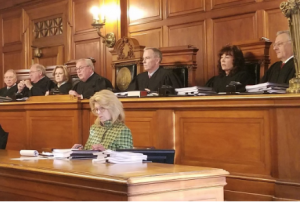In two decisions announced this week, the Kentucky Supreme Court was sharply divided in unholding the Right to Work legislation passed by the 2017 General Assembly and was unanimous in its decision that medical review panels are unconstitutional.
Right to Work
A sharply divided Kentucky Supreme Court narrowly upheld — 4-3 — Right to Work legislation passed by the 2017 General Assembly. The bill revised Kentucky law to prevent workers from having to join labor unions or pay dues, as a condition of employment.
Supporters tout Right to Work as an economic development tool and, in fact, Braidy Industries, which is building a large aluminum plant in Ashland, said enactment of the legislation was a major factor in the decision to come to Kentucky.
Shortly after it was approved, Fred Zuckerman, President of Teamsters Local 89, and William Londrigan, President of the Kentucky State AFL-CIO, filed a lawsuit at Franklin Circuit challenging the legislation, with Gov. Matt Bevin and then-Labor Cabinet Secretary Derrick Ramsey named as defendants.

Franklin Circuit Judge Thomas Wingate dismissed the case, and the Supreme Court agreed to accept a direct transfer of the appeal, bypassing the Court of Appeals. Oral arguments were heard on Aug. 10.
The unions argued the bill violated the Kentucky Constitution in four ways: Equal protection; special legislation, meaning it was for the benefit of the few to the detriment of most people; taking for public purpose without just compensation; and emergency legislation, that there was no emergency present requiring the bill to take effect as soon as it was signed by the Governor.
In a 4-3 decision, the High Court held the bill did not violate either the Kentucky or U. S. Constitutions and upheld the Franklin Circuit Court decision.
“The majority opinion flies in the face of the undisputed fact that this law singles out labor unions and their thousands of members for unfair and discriminatory treatment and violates unions’ rights to equal protection under the Kentucky Constitution,” Londrigan said. “This decision will further erode the wages and living standards of Kentucky’s working men and women, which is the apparent purpose of this act.
“The Kentucky Supreme Court and the Kentucky General Assembly are not going to determine the fate of Kentucky’s unions and workers who will continue to fight for fair wages, benefits and job security.”
Londrigan said they are considering petitioning the Court for a rehearing, but have 20 days to decide.
Gov. Bevin, meanwhile, applauded the ruling. “With $13.5 billion invested in the Commonwealth since the passage of House Bill 1 in 2017 and business leads increasing by 40 percent this year, we are already reaping the benefits of this transformative legislation. Kentucky is experiencing unprecedented economic growth, as we provide right to work protection to every worker in our state and send a clear message to the world that we are truly open for business.”
Medical Review Panels
The Kentucky Supreme Court handed down a unanimous ruling that legislation establishing medical review panels was unconstitutional.
The High Court upheld an October 2017 decision by Franklin Circuit Judge Phillip Shepherd, which said the Medical Review Panel bill was unconstitutional due to violations of the Equal Protections Clause, the Separation of Powers Doctrine and the open-courts and jural rights guarantee.
The latter refers to Section 14 of the Kentucky Constitution which states: “All courts shall be open, and every person for an injury done him in his lands, goods, person or reputation, shall have remedy by due course of law, and right and justice administered without sale, denial or delay.”
Justices said: “Of all the rights guaranteed by state constitutions but absent from the federal Bill of Rights, the guarantee of a right of access to the courts to obtain a remedy for injury, is possibly the most important,” a quote they attributed to Thomas R. Phillips in The Constitutional Right to a Remedy.
The case involves a child, Ezra Claycomb, who suffers from severe brain damage and cerebral palsy, allegedly caused by medical malpractice.
Under Senate Bill 4, passed by the 2017 General Assembly, all such lawsuits were subject to a medical review panel, which had nine months to render an opinion, before the suit could proceed.
The Kentucky Medical Association issued a statement saying they were deeply disappointed in the ruling.
“Kentucky now remains one of the few states in the country with no meaningful tort reform, including medical liability reform, making our system more susceptible to higher costs and frivolous lawsuits. Many individuals and groups worked closely with legislative leaders and legal experts to create a fair policy that would pass constitutional muster because of the need to implement tort reform in Kentucky.
“Despite this work, the Court has chosen to uphold the status quo that discourages physician recruitment, inhibits access to quality healthcare, and increases patient costs, while also ensuring that the litigation process for those who have justifiable claims will remain long and complicated.”
Sarah Davasher-Wisdom, Chief Operating Officer of Greater Louisville, Inc., had a similar sentiment.
“Greater Louisville Inc. has long advocated for legislative solutions that will help address the Commonwealth’s costly medical liability climate, which studies have shown to be one of the top 10 worst in the country. We will continue to pursue additional legal reforms that will grow our health and aging care business sectors and attract top talent.”
Kentucky Today reporter Tom Latek and staff report



















